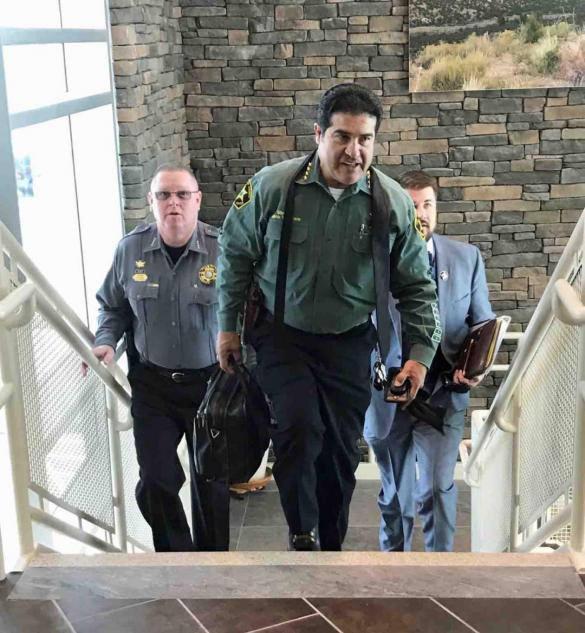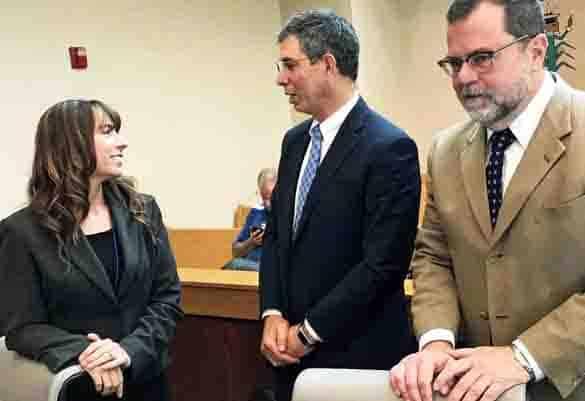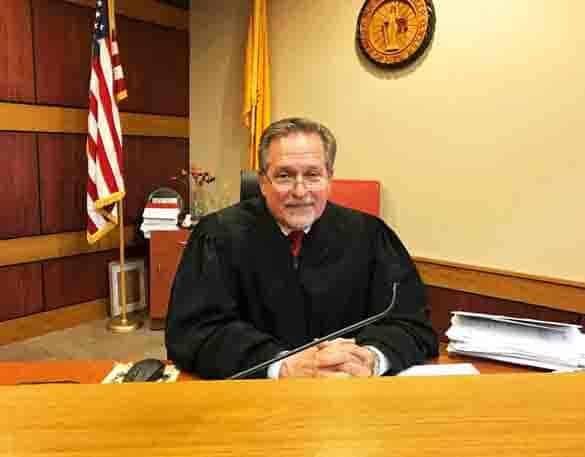 Los Alamos County Sheriff Marco Lucero arrives at the Los Alamos Justice Center Thursday morning with his attorney Blair Dunn, right, and Cibola County Undersheriff Michael Munk, left, for a hearing before First Judicial District Judge Francis J. Mathew. Photo by Maire O’Neill/ladailypost.com
Los Alamos County Sheriff Marco Lucero arrives at the Los Alamos Justice Center Thursday morning with his attorney Blair Dunn, right, and Cibola County Undersheriff Michael Munk, left, for a hearing before First Judicial District Judge Francis J. Mathew. Photo by Maire O’Neill/ladailypost.com  Los Alamos County Assistant Attorney Kathryn Thwaits chats with County Council Chair David Izraelevitz, center, and County Attorney Alvin Leaphart prior to Thursday’s hearing. Photo by Maire O’Neill/ladailypost.com
Los Alamos County Assistant Attorney Kathryn Thwaits chats with County Council Chair David Izraelevitz, center, and County Attorney Alvin Leaphart prior to Thursday’s hearing. Photo by Maire O’Neill/ladailypost.com First Judicial District Court Judge Francis J. Mathew took the request for an injunction against Los Alamos County Sheriff Marco Lucero filed by Los Alamos County Council under advisement Thursday morning following a hearing that lasted just over an hour.
Judge Mathew said he would issue his decision as quickly as possible.
At the outset, Los Alamos County Attorney Alvin Leaphart referred the Court to an emergency leave for amicus curiae brief request filed May 8 by local resident Greg White. Leaphart said he was not aware of any rule of civil procedure that allows non-parties to file an amicus brief and asked the Court to strike it from the record. Lucero’s attorney Blair Dunn supported Leaphart’s request and Judge Mathew agreed to strike White’s filing.
Leaphart told the Court the County is seeking an injunction to prevent the sheriff from performing duties that he is expressly prohibited from performing by the County Charter. He said the Charter amendment assigns the duty of enforcing the law to the police department and the sheriff is prohibited from performing the duties assigned by the charter to the police department.
Leaphart said he thinks the record is clear that the sheriff has enforced the laws of the state.
“The sheriff has indicated his belief that he has a duty to do that under state law and that he will continue to enforce the laws of the state and the ordinances of the county if he is not stopped or if an order is not entered here today stopping the sheriff from exceeding the limits of the lawful authority placed on his office by the charter,” he said.
Leaphart said the charter-making authority granted to incorporated counties by the citizens of New Mexico who adopted this charter amendment by a special election in 1964 gives the citizens of the Incorporated County the specific right of self-government. He said the citizens of the County could form a charter that determined the form and organization of their government, decide who was going to be an elected official in the Incorporated county, and have the ability to designate those officers and employees of the Incorporated County that could perform duties assigned by law to the offices of the treasurer, clerk, assessor, surveyor and sheriff.
An Incorporated County is a unique form of government, which has all the powers, duties and privileges a municipality has, Leaphart said. He said the charter is not the will of the County Council, it’s the will of the citizens of the county and that it represents how the citizens of this county consent to be governed.
“There are methods to amend this charter. An initiative process could be made. An ordinance could be put on the ballot to change the structure, to create a sheriff’s department that has all the powers and duties of law enforcement of a police department. All those things could be done. These rights were given to the citizens of the County directly by the citizens of the state of New Mexico,” Leaphart said.
He said the charter has guided former holders of the office of sheriff for 42 years.
“We have not had this problem for 42 years. The current sheriff disregards the charter language, says, ‘I don’t have to obey that. I have duties and obligations that allow me to violate the express language of the charter’. That fails to recognize the rights of self-government of the citizens of this county,” Leaphart said.
He to allow the sheriff to keep the peace, to enforce the laws of the state or ordinances of the county disregards the consent of the governed and simply violates the language in the charter which prohibits the sheriff from doing so.
“That’s the harm to the county – an elected official acting beyond the scope of his legal authority insults the charter and tramples upon the rights of the citizens of this county to form a government that places these duties solely and conclusively on the police department,” Leaphart said.
Judge Mathew asked if there was a conflict between the statute and the charter given the language of both.
“I don’t think so because the Incorporated County has the authority to assign the duties, to take them away from the sheriff and assign them to police officers and because we are a municipality, those police officers have all the duties of a sheriff. The argument would be that the sheriff of the incorporated county of Los Alamos can’t violate that provision because he doesn’t have that authority because it has been constitutionally removed from him by the citizens of the Incorporated County,” Leaphart responded.
Dunn told the Court Lucero also has petition for injunctive relief.
“If the court finds that the sheriff does have other duties assigned by statute, the County has a statutory responsibility, a constitutional responsibility to make sure he has what he needs to carry out those duties assigned to him by the statutes,” he said.
Dunn said the crux is and where the county has gone astray ultimately is that they have designated the office of the sheriff. That means that they have it. They didn’t have to do that. They had the opportunity to say, ‘No we don’t want the office of the sheriff’, Dunn said.
He said the statute say the sheriff shall be the conservator of peace in the county.
“It doesn’t say may if the Incorporated County wants to let him have those duties. It says ‘shall’. That means the elected sheriff has these responsibilities,” Dunn said.
Dunn told the Court that very clearly there’s a conflict even within the charter itself because the charter says the sheriff will uphold the law as indicated in his oath of office.
“There’s conflict there if there is a difference between what the Incorporated County charter requires or states he cannot do and what the state statute requires him to do,” he said, adding that there is really no way that the powers the county has to make ordinance that that can infringe on what the legislature has said.
Dunn said there is simply no evidence that there is irreparable harm to the citizens of the County.
“There is however, the idea that the citizens of this county are being deprived again of having what the legislature gave them – a sheriff that shall be the conservator of the peace,” he said.
Dunn pointed out that if the County wanted to get rid of the office of sheriff it could but that the issue of whether or not the citizens wanted to have a sheriff was decided in the recent ballot question where the majority said, ‘yes, we still want to have a sheriff’.
“If the County wants to get rid of having a sheriff with law enforcement powers, it can go back to this constitutional provision in the charter and it can get rid of the office. That’s the power that’s given to them. Not the power to assign the duties of the office,” he said, adding that the County is claiming it has more authority than it has ever been granted by the constitution.
Judge Mathew asked if it is possible to reconcile the charter with the statute without making it a constitutional question and if there really is a conflict. Dunn replied that it the sheriff does not do his duty in a particular way, or if someone comes to the sheriff to his attention that there is a criminal act going on he has an affirmative duty under the statute and failure to respond puts him in a position of conflict because if he doesn’t do what the statute says, he could be prosecuted.
In his rebuttal, Leaphart said the Incorporated County could have created a county marshal, or called the position a marshal, could have called it a sheriff or an elected police chief.
“That the office is named ‘the sheriff’, doesn’t allow that statute to trump this constitutional ability to form that office with the powers deemed fit by the citizens of the Incorporated County. Because of that, I don’t think there is any conflict between the statute and the charter,” Leaphart said. “`It is odd – why would you need two distinct law enforcement agencies in an incorporated county which is necessarily small and not very populated. It seems the reason and the rationale of this ability is so that incorporated counties don’t have to duplicate services. It is a mechanism to avoid waste which is why the citizens have flexibility in approving the form and structure of their government.”
Leaphart concluded by repeating that the charter expresses the will of the people when it states that the sheriff shall not duplicate the duties assigned by the charter to the police department.
“Take the constitutional argument out – that is what the charter says. When the sheriff enforces the laws of the state, keeps the peace and enforces the ordinances of the county, he’s violating the charter. He’s violating the specific words of the charter. Even though he may have authorities of a peace officer, even though he has his powers and duties, when he exercises those to enforce the laws of the state he is violating the charter, he’s violating the restrictions placed on his duties by the citizens of the Incorporated County,” he said.
Judge Mathew asked what exactly is the harm the County is seeking to avoid besides the conflict with the charter. Leaphart replied that the sheriff is in contempt of the charter, acting unlawfully and in a way that tramples on certain rights of self-government as expressed by the people.
“The sheriff of the Incorporated County of Los Alamos is prohibited from using his office to keep the peace, enforce the laws of the state or ordinances of the county. By doing that, he’s acting unlawfully, acting in disregard of the consent of the governed. And that’s a harm, it’s not a monetary harm, it’s a harm to the rights of the citizens of the county. The harm is not like pollution being put into a river or that kind of physical harm, it’s a harm to the rights of the people of the county,” Leaphart said.
 First Judicial District Judge Francis J. Mathew presides Thursday morning in District Court in Los Alamos. Photo by Maire O’Neill/ladailypost.com
First Judicial District Judge Francis J. Mathew presides Thursday morning in District Court in Los Alamos. Photo by Maire O’Neill/ladailypost.com Los Alamos County Sheriff Marco Lucero, second from left, his wife, Sandy and sheriff’s candidate James Whitehead, left, chat with supporters following Thursday’s hearing at the Los Alamos Justice Center. Photo by Maire O’Neill/ladailypost.com
Los Alamos County Sheriff Marco Lucero, second from left, his wife, Sandy and sheriff’s candidate James Whitehead, left, chat with supporters following Thursday’s hearing at the Los Alamos Justice Center. Photo by Maire O’Neill/ladailypost.com

